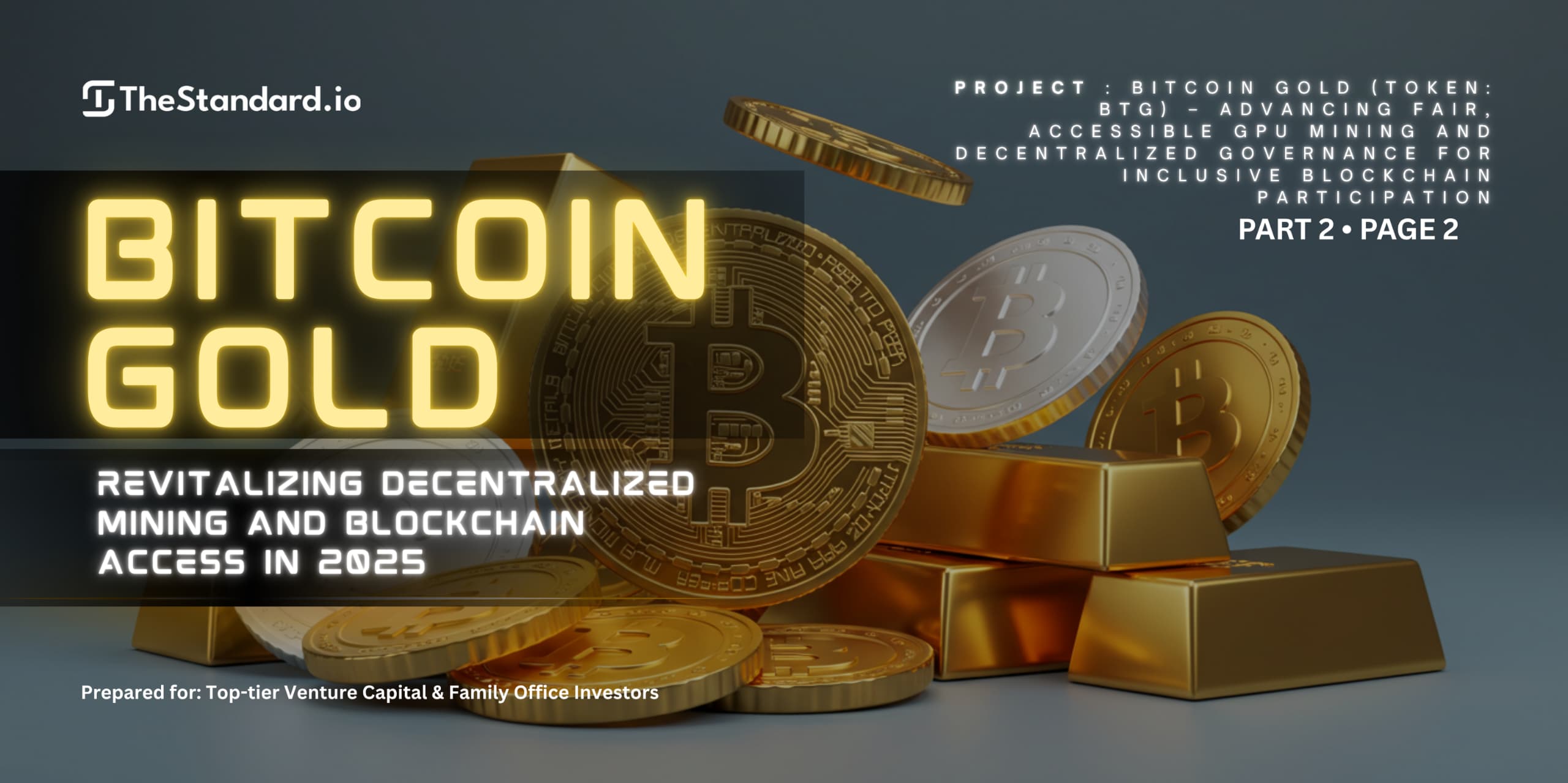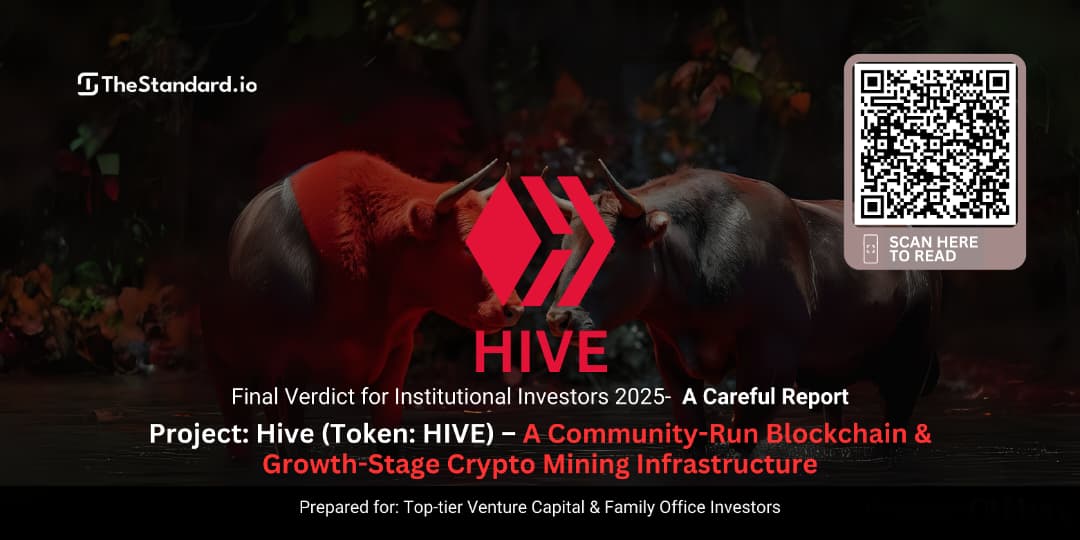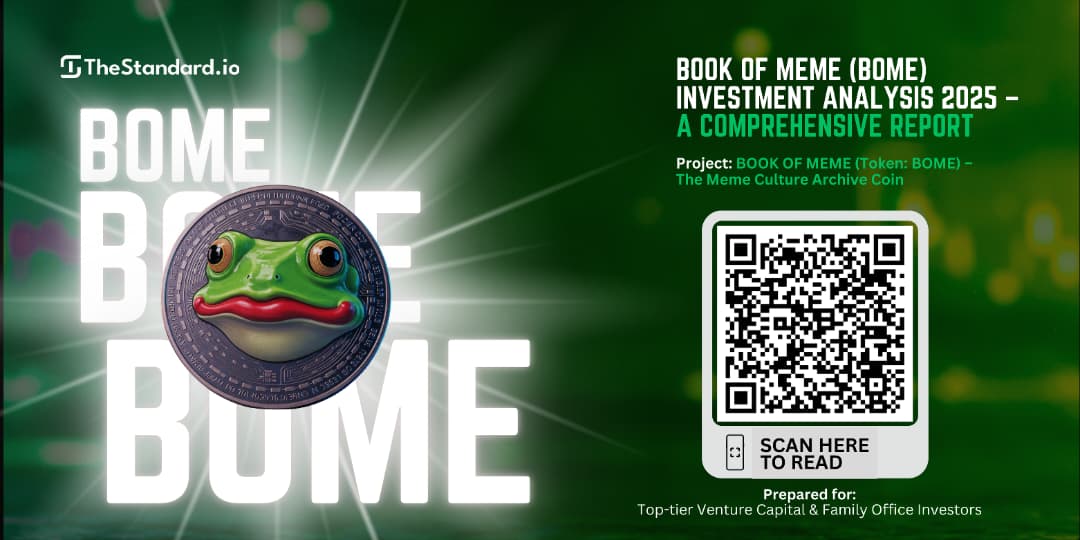Bitcoin Gold (BTG): Revitalizing Decentralized Mining and Blockchain Access in 2025 / Part 2

Part 2 / Page 2
Competition from Alternative Protocols
The blockchain space continues to be fiercely competitive with alternatives emphasizing proof-of-stake (PoS) consensus for energy efficiency, robust DeFi ecosystems, and privacy features. BTG must innovate continually to maintain relevance amid these competing narratives (“Cryptocurrency Market Competition,”).
5J. Summary: Strategic Imperatives and Outlook
Bitcoin Gold’s strategic imperatives for 2025 and beyond focus on balancing security enhancement, ecosystem growth, and community governance to carve sustainable value in a competitive marketplace.
Its planned merge with Bitcoin’s network promises to address longstanding security concerns while preserving BTG’s core differentiator—its accessible ASIC-resistant mining protocol. Meanwhile, cross-chain interoperability and DAO governance development represent transformational steps that extend BTG’s functionality and community control, fostering user engagement beyond passive token holding.
Bitcoin Gold’s focus on emerging markets and decentralized mining participation offers a growth avenue aligned with increasing global demand for inclusivity in digital finance. Effective collaboration with exchanges, blockchain platforms, and sustainable energy projects further strengthens its positioning.
However, BTG must navigate persistent challenges, including market liquidity constraints, regulatory risks, and technological competition. Commitment to open communication, ongoing technical enhancements, and governance transparency will be critical to mitigating these obstacles.
In conclusion, Bitcoin Gold remains a resilient and evolving digital asset embodying Bitcoin’s original decentralization ethos while adapting innovatively to the modern blockchain ecosystem. Its success will depend on effective execution of its roadmap, strategic partnerships, and ability to deliver value to miners, holders, and users in a rapidly maturing digital asset landscape.
6A. Jurisdiction and Legal Structure
Bitcoin Gold (BTG) operates as a decentralized cryptocurrency without a centralized corporate entity owning or controlling the blockchain protocol. Its open-source codebase and network are maintained by a dispersed global community of developers and miners rather than a company incorporated in a traditional jurisdiction. However, the Bitcoin Gold Foundation, a non-profit organization initially established to coordinate development, support, and marketing efforts, has historically been registered in jurisdictions such as Singapore (according to project documentation) and has engaged developers and legal advisors across multiple countries to ensure compliance with relevant laws. This foundation structure allowed BTG to raise funds and manage resources while emphasizing decentralized governance transition over time.
Since BTG is inherently decentralized, legal responsibility is diffuse, complicating direct regulatory oversight. Nonetheless, exchanges and service providers interacting with the BTG protocol operate under local laws corresponding to their registration jurisdictions—meaning regulatory compliance occurs indirectly through platforms and custodians supporting BTG (“Treatment of Bitcoin Under U.S. Property Law,”).
6B. Securities Law
Bitcoin Gold’s token (BTG) is generally classified as a non-security digital asset, similar to Bitcoin itself. Given its mining-based issuance without a centralized issuing entity or promises of profit from a third party, BTG fits within the common regulatory frameworks where tokens representing decentralized cryptocurrencies are not securities under most jurisdictions’ definitions, including the U.S. SEC’s SEC Framework.
The SEC’s guidance distinguishes between utility tokens, security tokens, and cryptocurrencies based on centralized control and investor expectations. BTG’s issuance via mining and snapshot distribution, absence of an ICO or equity-like claims, and its functional use as a medium of exchange reduce the likelihood of being classified as a security (“Legal Issues Surrounding Cryptocurrency,” ).
However, the regulatory environment is dynamic. Certain jurisdictions may assess token activities differently, especially where governance rights or fundraising influence investor returns. BTG continues to monitor such developments but remains positioned as a decentralized currency rather than a security.
6C. Legal Risks
Bitcoin Gold faces legal risks common to decentralized cryptocurrencies, including:
Regulatory Uncertainty: Because of evolving laws globally, BTG’s legal status and compliance requirements may shift, especially regarding anti-money laundering (AML), know your customer (KYC), and taxation frameworks. Unclear regulation may lead to operational challenges for exchanges and wallet providers supporting BTG and create indirect impacts on users (“Cryptocurrency Legality by Country,”).
Law Enforcement Actions: BTG tokens, like Bitcoin, have occasionally been involved in judicial forfeiture actions linked to illicit activities, such as the 2020 seizure of approximately 69,370 BTG tokens connected to Silk Road marketplace proceedings in the U.S. District Court Northern District of California (“United States of America v. Approximately 69,370 Bitcoin (BTC), Bitcoin Gold (BTG)...”). Such cases highlight the risk of regulatory scrutiny and potential asset freezes when tokens intersect with illegal use.
Litigation and Custody Liability: As with many decentralized projects, the absence of formal governance entities or custodians exposes token holders to counterparty risks when dealing with third-party services. Exchanges delisting coins or legal suits against platform operators could indirectly affect BTG holders.
Overall, these legal risks underscore the importance of compliance and risk management strategies for stakeholders interacting with the BTG ecosystem.
6D. KYC/AML Policies
Bitcoin Gold’s core protocol does not enforce or require KYC/AML measures as it is a permissionless, decentralized blockchain similar to Bitcoin. However, compliance responsibilities fall primarily on exchanges, custodians, and wallet providers offering BTG trading and storage services.
Leading cryptocurrency exchanges listing BTG, such as Binance and KuCoin, implement mandatory KYC/AML procedures for onboarding users, transaction monitoring, and suspicious activity reporting. These measures align with Financial Action Task Force (FATF) recommendations and local regulations to combat money laundering and terrorist financing risks (“Cryptocurrency Regulatory Environment 2025,”).
BTG’s community and foundation encourage integration of compliance tools and transparency protocols to foster greater trustworthiness and broaden institutional adoption without compromising decentralized principles.
Summary:
Bitcoin Gold operates within a complex legal and regulatory environment shaped by its decentralized structure and global user base. Without a central legal entity controlling BTG, jurisdictional authority primarily applies to service providers, exchanges, and developers supporting the ecosystem. BTG tokens are largely considered non-securities, given their mining-based issuance and functional use as currency, though regulatory interpretations may vary regionally.
Legal risks stem from evolving compliance regimes, potential law enforcement actions involving tokens, and indirect litigation risks through third-party providers. KYC and AML enforcement happens externally through exchanges adhering to global standards. Adapting proactively to shifting regulations and reinforcing compliance frameworks alongside community-driven governance are crucial for Bitcoin Gold’s continued legitimacy and institutional growth in 2025 and beyond.
Thank you for taking the time to read this article. We invite you to explore more content on our blog for additional insights and information.
https://www.thestandard.io/blog
"If you have any comments, questions, or suggestions, please do not hesitate to reach out to us at [ https://discord.gg/K72hed6FRE ]. We appreciate your feedback and look forward to hearing from you."
CLICK HERE TO CONTINUE
PART 2 / PAGE 3:
6 of the best crypto wallets out there
Vulputate adipiscing in lacus dignissim aliquet sit viverra sed etiam risus nascetur libero ornare non scelerisque est eu faucibus est pretium commodo quisque facilisi dolor enim egestas vel gravida condimentum congue ultricies venenatis aliquet sit.
- Id at nisl nisl in massa ornare tempus purus pretium ullamcorper cursus
- Arcu ac eu lacus ut porttitor egesta pulvinar litum suspendisse turpis commodo
- Dignissim hendrerit sit sollicitudin nam iaculis quis ac malesuada pretium in
- Sed elementum at at ultricies pellentesque scelerisque elit non eleifend
How to choose the right wallet for your cryptos?
Aliquet sit viverra sed etiam risus nascetur libero ornare non scelerisque est eu faucibus est pretium commodo quisque facilisi dolor enim egestas vel gravida condimentum congue ultricies venenatis aliquet sit quisque quis nibh consequat.

How to ensure the wallet you’re choosing is actually secure?
Integer in id netus magnis facilisis pretium aliquet posuere ipsum arcu viverra et id congue risus ullamcorper eu morbi proin tincidunt blandit tellus in interdum mauris vel ipsum et purus urna gravida bibendum dis senectus eu facilisis pellentesque.
What is the difference from an online wallet vs. a cold wallet?
Integer in id netus magnis facilisis pretium aliquet posuere ipsum arcu viverra et id congue risus ullamcorper eu morbi proin tincidunt blandit tellus in interdum mauris vel ipsum et purus urna gravida bibendum dis senectus eu facilisis pellentesque diam et magna parturient sed. Ultricies blandit a urna eu volutpat morbi lacus.
- At at tincidunt eget sagittis cursus vel dictum amet tortor id elementum
- Mauris aliquet faucibus iaculis dui vitae ullamco
- Gravida mi dolor volutpat et vitae lacus habitasse fames at tempus
- Tellus turpis ut neque amet arcu nunc interdum pretium eu fermentum
“Sed eu suscipit varius vestibulum consectetur ullamcorper tincidunt sagittis bibendum id at ut ornare”
Please share with us what is your favorite wallet using #DeFiShow
Tellus a ultrices feugiat morbi massa et ut id viverra egestas sed varius scelerisque risus nunc vitae diam consequat aliquam neque. Odio duis eget faucibus posuere egestas suspendisse id ut tristique cras ullamcorper nulla iaculis condimentum vitae in facilisis id augue sit ipsum faucibus ut eros cras turpis a risus consectetur amet et mi erat sodales non leo.

Subscribe to our newsletter.
Get the latest alpha from us, and the Chainlink build program in an easy-to-read digest with only the best info for the insider.
It's an easy one-click unsub, but I bet you won't; the info is just too good.

Try the future of borrowing today.
Don't wait. It's easy to open a free smart vault
then start earning a yield and borrowing today.
0xf5A27E55C748bCDdBfeA5477CB9Ae924f0f7fd2e
USDs Contract on Arbitrum:
0x2Ea0bE86990E8Dac0D09e4316Bb92086F304622d










